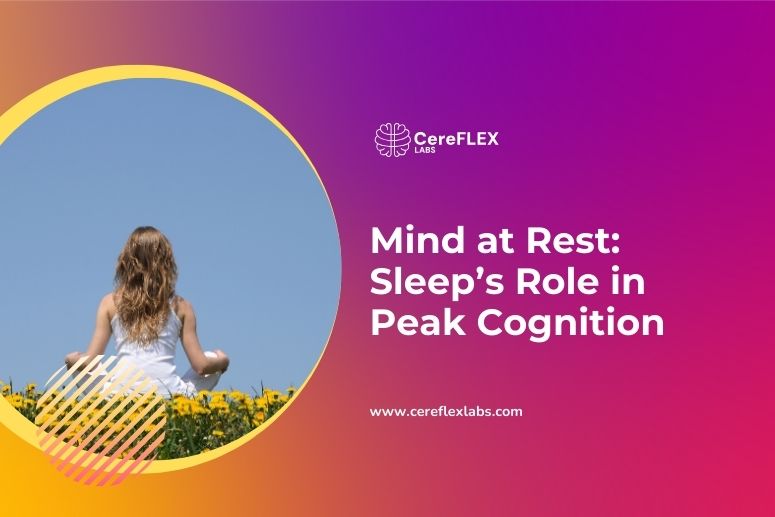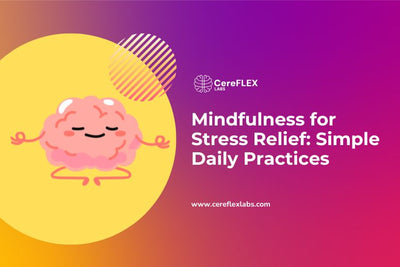Sleep is one of the most powerful—and most overlooked—tools for improving brain performance.
While it’s easy to focus on what we do when we’re awake, many of the brain’s most important functions happen while we rest. Sleep supports memory, emotional balance, and problem-solving by strengthening neural pathways and clearing mental clutter.
Even mild sleep deprivation can affect focus, reaction time, and learning. Over time, poor sleep undermines decision-making, mental clarity, and long-term cognitive health.
Optimal brain function depends not only on what you do during the day, but on how well your brain recovers at night. And that recovery begins with high-quality sleep—a cornerstone of focus and productivity hacks.
Why Sleep Matters for Cognitive Performance
Cognitive performance refers to how well your brain handles essential mental tasks like memory, learning, focus, decision-making, and problem-solving. It’s what helps you stay sharp in meetings, absorb new information, or adapt to high-pressure situations.
Sleep plays a central role in maintaining and enhancing these functions. While you rest, your brain repairs neural pathways, consolidates memories, processes emotions, and removes waste built up during the day.
This nightly reset is critical for mental clarity. Without it, the brain struggles to retain information, manage stress, and think quickly.
The circadian rhythm—your body’s internal clock—regulates when you feel alert or sleepy. It responds to light cues and controls hormones like melatonin (to promote sleep) and cortisol (to support alertness in the morning).
Disruptions to this rhythm—like staying up late, exposure to screens, or irregular sleep schedules—can affect your ability to focus, remember, and regulate emotions.
In short, sleep is not downtime. It’s a neurological upgrade that fuels next-day performance and long-term brain health. Developing consistent sleep patterns is one of the most effective habits for strengthening focus, memory, and how to improve cognitive resilience.
What Happens to the Brain During Sleep
Sleep isn't a passive state—it’s a complex cycle of neurological activity that supports memory, learning, emotional balance, and physical recovery. Two stages play especially important roles in cognitive function: REM sleep and deep sleep.

REM Sleep (Rapid Eye Movement)
REM sleep is when the brain is most active. This is the stage where vivid dreaming occurs, but it also supports creativity, emotional processing, and long-term memory.
During REM, the brain integrates new experiences with existing knowledge, helping with problem-solving and mental clarity.
Key REM features:
- Brain activity resembles wakefulness
- Breathing becomes irregular
- Body remains still to prevent acting out dreams
- Thought and emotional networks reorganize
Sleep cycles last about 90 minutes, and you typically experience 4–5 REM periods per night.
Deep Sleep (Slow-Wave Sleep)
Deep sleep, or slow-wave sleep, is the most restorative phase. The brain produces low-frequency delta waves and shifts focus to physical healing and immune function.
Cognitively, deep sleep is essential for procedural memory—learning new skills or physical tasks.
During this stage:
- The body repairs tissue and boosts immune responses
- The brain consolidates learned motor skills and habits
- Energy is restored for the next day’s mental performance
Brain Functions During Sleep
Every sleep stage contributes to neuroplasticity—the brain’s ability to adapt and rewire based on experience. While we sleep, the glymphatic system is more active, flushing out toxins and cellular waste that build up while we’re awake.
This nightly “cleansing” may help protect against neurodegenerative diseases and cognitive decline.
Non-REM and REM stages work together to strengthen memory, stabilize emotions, and refresh attention systems—setting the brain up for sharper thinking and learning the next day.
Is sleep essential for neural plasticity in humans?
Yes—sleep plays a fundamental role in brain plasticity, the process that allows the brain to adapt, learn, and recover.
During both slow-wave sleep and REM sleep, the brain reorganizes neural pathways, consolidates new information, and strengthens useful connections while pruning weaker ones. These changes are core to two key models of brain development and repair: synaptic homeostasis and memory consolidation.
Research shows that when sleep is disrupted, plasticity suffers—affecting everything from motor recovery after injury to learning new cognitive skills. This makes sleep a crucial part of rehabilitation for brain injuries and neurological conditions.
Monitoring brain activity during sleep can even offer insights into how well the brain is responding to therapy or recovery programs.
In short, quality sleep supports the brain’s ability to rewire itself—making it essential for everything from everyday learning to long-term recovery.1
Short-Term Cognitive Impacts of Poor Sleep
Sleep deprivation doesn’t just make you feel tired—it immediately impacts how your brain works.
Lack of sleep reduces reaction time, focus, learning ability, and even emotional control. It also impairs physical coordination and can lead to serious safety risks like drowsy driving or work-related errors.

Poor Focus and Attention
Without adequate sleep, the brain’s ability to sustain attention drops. This makes it harder to concentrate, think strategically, or stay alert in high-stakes situations.
Excessive Sleepiness
Daytime fatigue often leads to microsleeps—brief lapses in consciousness lasting seconds. These can occur without warning, affecting everything from driving to conversation.
Reduced Adaptability
Tired brains struggle with flexibility and creative problem-solving. Sleep loss is linked to more rigid thinking and a decreased ability to adapt quickly to change.
Emotional Dysregulation
Sleep deprivation makes the amygdala more reactive and weakens its connection to the prefrontal cortex. This imbalance results in mood swings, irritability, and reduced impulse control.
Reduced Memory and Learning
Sleep supports memory consolidation. Without it, the brain struggles to transfer short-term experiences into long-term knowledge—hurting learning, skill retention, and performance.
Long-Term Effects of Poor Sleep on Cognition
Chronic sleep deprivation doesn’t just affect your short-term performance—it can also lead to lasting damage in how the brain stores memories, processes information, and protects itself from disease.
Studies link persistent poor sleep to cognitive decline and neurodegenerative conditions such as dementia and Alzheimer’s disease.
Impaired Memory Consolidation
Both non-REM (NREM) and REM sleep are essential for memory formation. NREM supports factual recall, while REM helps consolidate emotional and procedural memories. Disrupted sleep interferes with these processes and can even contribute to the formation of false memories.
Increased Alzheimer’s Risk
One critical function of sleep is clearing beta-amyloid, a toxic protein associated with Alzheimer’s disease. Without enough deep sleep, these proteins accumulate, potentially accelerating cognitive decline.
Even a single night of sleep deprivation has been shown to increase beta-amyloid levels, highlighting how sensitive the brain is to consistent rest.
Over time, chronic poor sleep undermines attention, problem-solving ability, and emotional regulation—raising the risk of long-term cognitive issues.

How many hours of sleep are best for mental performance?
The amount of sleep you need depends on your age and individual health, but one thing is clear: both duration and quality matter when it comes to optimal brain function.
While younger people generally need more sleep to support development, older adults benefit from consistent, restorative sleep to maintain focus, memory, and mood.
According to the Centers for Disease Control and Prevention (CDC), the recommended sleep durations by age are:
- Birth to 3 months: 14–17 hours
- 4 to 12 months: 12–16 hours (including naps)
- 1 to 2 years: 11–14 hours (including naps)
- 3 to 5 years: 10–13 hours (including naps)
- 6 to 12 years: 9–12 hours
- 13 to 18 years: 8–10 hours
- 18 to 60 years: 7 or more hours
- 61 to 64 years: 7–9 hours
- 65+ years: 7–8 hours
Lifestyle Hacks for Better Sleep and Brain Health
Better sleep doesn’t require a total lifestyle overhaul—just small, consistent changes that support your natural rhythms.
Improving sleep quality enhances cognitive performance, emotional regulation, and overall brain resilience. Integrating simple, sustainable daily rituals for mental clarity can create noticeable improvements in how you think and feel.

Stick to a Schedule
Go to bed and wake up at the same time each day—even on weekends. This reinforces your circadian rhythm and helps your brain transition into deep, restorative sleep more efficiently.
Unplug Before Bed
Turn off screens at least 30–60 minutes before sleep. Blue light from phones, tablets, and TVs can disrupt melatonin production, making it harder to fall and stay asleep.
Optimize Your Sleep Environment
Keep your room cool, dark, and quiet. Ideal sleep temperatures fall between 18–20°C (65–68°F). Consider blackout curtains, white noise, or sleep masks to create a deeper sense of calm.
Wind Down with a Ritual
Build a calming pre-bed routine—like stretching, journaling, or reading—to signal your brain that it’s time to relax. Repetition makes this ritual more effective over time.
Move and Fuel Smartly
Daily physical activity helps regulate sleep, but avoid intense workouts close to bedtime. Choose whole foods and limit caffeine after mid-afternoon to reduce nighttime stimulation.
Manage Stress and Cortisol
Chronic stress raises cortisol, making it harder to relax. Deep breathing, meditation, and herbal teas (like chamomile or lemon balm) can naturally ease the nervous system.
The Role of Sleep-Supporting Nootropics in Brain Health
Quality sleep is foundational for cognitive recovery—but for many people, stress, overstimulation, or hormonal imbalances can disrupt it. This is where natural nootropics can help.
Unlike stimulants that push alertness, certain nootropics work by supporting the brain’s natural ability to relax, regenerate, and prepare for high performance the next day.
Common sleep-enhancing nootropics include:
- L-Theanine – Promotes relaxation without drowsiness by increasing alpha brain waves
- Magnesium – Regulates neurotransmitters and supports deep sleep
- Ashwagandha – Reduces cortisol levels and promotes calm under chronic stress
When taken as part of an evening routine, these compounds can improve sleep depth and quality—both of which are key to memory, mood stability, and overall brain health.
A well-designed nighttime formula, like CereFlex PM, works in synergy with your circadian rhythm, supporting restful sleeps, recovery, and next day clarity.
Combined with good sleep hygiene, natural nootropics for better sleep can help unlock deeper rest and stronger next-day mental performance.
Conclusion: Sleep Is the Foundation of Brain Health
Sleep isn’t just rest—it’s active repair. Every night, your brain clears waste, restores energy, and strengthens the very systems that support memory, focus, emotional balance, and decision-making.
Without enough quality sleep, cognitive function begins to erode—slowly at first, then more noticeably over time.
Prioritizing consistent, restorative sleep is one of the simplest and most powerful ways to support long-term brain health. And when paired with the right nootropic support, like CereFlex PM, your brain is better equipped to recover, reset, and perform at its peak.
Whether you're looking to sharpen your thinking today or protect your mind for the future, sleep is where the real gains begin.






